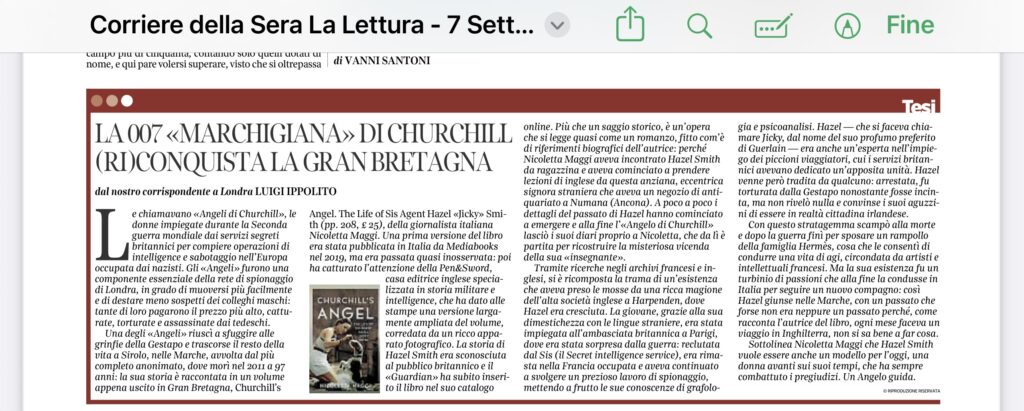

Il testo integrale in italiano. Below an English translation
LA 007 «MARCHIGIANA» DI CHURCHILL (RI)CONQUISTA LA GRAN BRETAGNA
dal nostro corrispondente a Londra LUIGI IPPOLITO
Le chiamavano «Angeli di Churchill», le donne impiegate durante la Seconda guerra mondiale dai servizi segreti britannici per compiere operazioni di intelligence e sabotaggio nell’Europa occupata dai nazisti. Gli «Angeli» furono una componente essenziale della rete di spionaggio di Londra, in grado di muoversi più facilmente e di destare meno sospetti dei colleghi maschi: tante di loro pagarono il prezzo più alto, catturate e assassinate dai tedeschi.
Una degli «Angeli» riuscì a sfuggire alle grinfie della Gestapo e trascorse il resto della vita a Sirolo, nelle Marche, avvolta dal più completo anonimato, dove morì nel 2011 a 97 anni: la sua storia è raccontata in un volume appena uscito in Gran Bretagna, Churchill’s Angel. The Life of SIS Agent Hazel “Jicky” Smith (pp. 208, £25), della giornalista italiana Nicoletta Maggi. Una prima versione del libro era stata pubblicata in Italia da Mediabooks nel 2019, ma era passata quasi inosservata: poi ha catturato l’attenzione della Pen & Sword, casa editrice inglese specializzata in storia militare e intelligence, che ha dato alle stampe una versione largamente ampliata del volume, corredata da un ricco apparato fotografico. La storia di Hazel Smith era sconosciuta al grande pubblico, ma il Guardian l’ha subito inserita online.
Più che un saggio storico, è un’opera che si legge quasi come un romanzo, visto com’è di riferimento biografico dell’autrice: perché Nicoletta Maggi aveva incontrato Hazel Smith da ragazzina e aveva cominciato a prenderne lezioni di inglese da questa anziana, eccentrica signora straniera che aveva un negozio di antiquariato a Numana (Ancona). A poco a poco i dettagli del passato di Hazel hanno cominciato a emergere e alla fine L’Angelo di Churchill lasciò i suoi diari proprio a Nicoletta, che da lì è partita per ricostruire la misteriosa vicenda della sua «insegnante».
Tramite ricerche negli archivi francesi e inglesi, Maggi ha ricostruito la vita di resistenza e di spionaggio di Hazel, la quale si faceva chiamare Jicky, dal nome del suo profumo preferito di Guerlain. Era esperta in grafologia e psicoanalisi. Hazel — che si faceva chiamare Jicky, dal nome del suo profumo preferito di Guerlain — era anche un’esperta nell’impiego dei piccioni viaggiatori, cui i servizi britannici avevano dedicato un’apposita unità. Hazel venne però tradita da qualcuno: arrestata, fu torturata dalla Gestapo nonostante fosse incinta, ma non rivelò nulla e convinse i suoi aguzzini di essere in realtà cittadina irlandese.
Con questo stratagemma scampò alla morte e dopo la guerra finì per sposare un rampollo della famiglia Hermès, cosa che le consentì di condurre una vita di agi, circondata da artisti e intellettuali francesi. Ma la sua esistenza fu un turbine di passioni che alla fine la condusse in Italia per seguire un nuovo compagno: così si stabilì nelle Marche, dove fino agli ultimi anni non rivelò più nulla del suo passato di spia. Non smise però di leggere e di scrivere: il suo archivio comprende diari e appunti manoscritti, oltre a una biblioteca dedicata a filosofia, grafologia e psicoanalisi.
Un angelo sopravvissuto.
English Translation:
THE ‘MARCHIGIAN’ CHURCHILL’S SECRET ANGEL CONQUERS BRITAIN AGAIN
from our London correspondent LUIGI IPPOLITO
They were called “Churchill’s Angels”, the women employed during the Second World War by the British secret services to carry out intelligence and sabotage operations in Nazi-occupied Europe. The “Angels” were an essential component of London’s spy network, able to move more easily and arouse less suspicion than their male colleagues: many of them paid the highest price, captured and killed by the Germans.
One of the “Angels” managed to escape the clutches of the Gestapo and spent the rest of her life in Sirolo, in the Marche region, wrapped in total anonymity, where she died in 2011 at the age of 97: her story is told in a volume just published in Great Britain, Churchill’s Angel. The Life of SIS Agent Hazel “Jicky” Smith (pp. 208, £25), by the Italian journalist Nicoletta Maggi. A first version of the book had been published in Italy by Mediabooks in 2019, but it went largely unnoticed: then it caught the attention of Pen & Sword, an English publishing house specialized in military history and intelligence, which released a much expanded version of the volume, complete with a rich photographic apparatus. The story of Hazel Smith was unknown to the general public, but the Guardian immediately highlighted it online.
More than a historical essay, it is a work that reads almost like a novel, given how biographical it is for the author: because Nicoletta Maggi had met Hazel Smith as a teenager and had begun taking English lessons from this eccentric elderly foreign lady who ran an antique shop in Numana (Ancona). Little by little, details of Hazel’s past began to emerge and in the end Churchill’s Angel left her diaries precisely to Nicoletta, who started from there to reconstruct the mysterious story of her “teacher”.
Through research in French and English archives, Maggi has reconstructed Hazel’s life of resistance and espionage, who called herself Jicky, after the name of her favorite Guerlain perfume. She was an expert in graphology and psychoanalysis. Hazel — who went by Jicky — was also skilled in the use of carrier pigeons, for which the British services had created a special unit. But Hazel was betrayed by someone: arrested, she was tortured by the Gestapo despite being pregnant, but she never revealed anything and convinced her captors that she was actually an Irish citizen.
With this stratagem she escaped death and after the war she ended up marrying a scion of the Hermès family, which allowed her to live a life of privilege, surrounded by artists and French intellectuals. But her existence was a whirlwind of passions that eventually brought her to Italy to follow a new partner: thus she settled in the Marche region, where until her final years she never again revealed anything about her past as a spy. However, she never stopped reading and writing: her archive includes diaries and handwritten notes, as well as a library dedicated to philosophy, graphology and psychoanalysis.
A surviving Angel.
Sotto l’articolo originale: